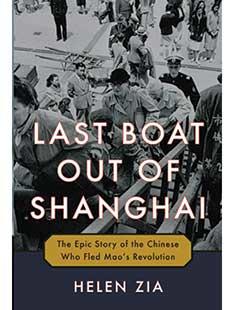
About 15 years ago, Helen Zia ’73 learned a 70-year-old family secret: Her mother was adopted — twice — amid the chaos of China’s eight-year war with Japan and subsequent civil war between Nationalists and Communists. Zia, who grew up in New Jersey, knew hardly anything about her mother’s life as an abandoned child in wartime Shanghai. But she wanted to understand the larger context of what others experienced during that generation.
What was first an attempt to find someone else to look into the topic turned into a 12-year undertaking — comprising more than 100 interviews with survivors of this exodus — for Zia, a journalist, activist, and former executive editor of Ms. magazine. The result is Last Boat Out of Shanghai (Ballantine). It follows four young people in Shanghai, including Zia’s mother, Bing, who in 1949 fled to the United States, just before the Communist takeover, on one of the last boats out, amid an exodus of millions.
Aside from your mom, tell us about the other people you follow.

Benny grew up incredibly privileged because his father collaborated with the Japanese during the occupation and grew rich through corruption. After the takeover, his father was jailed, his mother ran off with the bodyguard, and he was left to take care of himself and his younger siblings while also grappling with what his father had done.
Annuo was the daughter of a high-ranking Nationalist official. Their family had to flee to Taiwan, which was fraught with tension between the locals and some 2 million mainlanders.
Ho was already in the U.S. studying and experienced the war through increasingly panicked letters from back home while simultaneously fighting deportation, because officials didn’t know what to do about the 5,000 to 6,000 Chinese grad students stranded here.
How did you choose your subjects?
I concentrated on people who ended up in Hong Kong and Taiwan, the two largest points of first refuge. Several of them continued on to the U.S. And Benny stayed behind, so through him we glimpse life under the Communists. The book mentions people who went to Denmark, Israel, South America, and Australia. It wasn’t possible to include all the places people went, because in diaspora, people scatter to the wind.
There were no real records I could find — that’s why this took 12 years. There are no other books in English about this exodus. In China today, this information is suppressed.
Why is this history still relevant?
This was one of the most tumultuous periods of the 20th century. Yet it is not unique that people live through war and become migrants and have to re-establish themselves in places that do not welcome them. Leaving Shanghai was only the beginning for my subjects. In Hong Kong, the British authorities began closing the border. In Taiwan, tensions between locals and new arrivals turned deadly when Nationalists killed thousands of civilians during an anti-government uprising. And in the U.S., the INS was extremely anti-Chinese.
We’re in a time when refugee crises are in the news, with conversations about teargassing families, or ripping babies from parents’ arms, and putting them in cages. Such conversations happened 70 years ago. What do we do with these people? Are they a fifth column? Do we deport them? That part is timely, and I hope that by learning a bit of history, we can stop repeating it.
Interview conducted and condensed by Eveline Chao ’02











1 Response
Angela Weber s'81
6 Years AgoPraise for Helen Zia '73
My father, whose family escaped to Hong Kong, read Helen Zia's "Last Boat Out of Shanghai." He wrote, "The author captured the angst and ethos of that time ... perfectly. The time still lives in vivid memory. I still remember PL had to interrupt his attendance at St. John University. The family in HK was worried about his getting an airline ticket to come home." I have my father's contact information if the author wants to interview him and add to her collection of interviews. He appreciated the book very much.